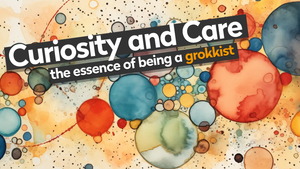Where Sustainability Meets the Soul
The call for sustainability and regeneration has grown loud. We recycle, reduce, and innovate, striving to mend the ecological wounds of our planet. Yet, in our pursuit of pragmatic economic, political, and technological solutions, we tend to forget to explore and express the soulful dimensions of our existence.
In the context of sustainability we live in a constant tension between the demand (what we should be doing) and what feels intrinsically valuable and meaningful on a personal level (the soul).
The concept of a soul is, to put it mildly, controversial. Whether we have a soul or not is open to debate. While I find arguments for the soul's persistence across lifetimes fascinating, there is a way to talk about the soul without needing to claim its ontological reality.
Finding the soul in sustainability is not about having a particular psychological makeup. Instead it’s about finding meaning, depth, joy, life force and a sense of belonging and fulfilment in life and in the reasons for pursuing sustainability.
Being philosophically healthy means we feel like we are living in line with what our soul longs for—we feel existentially well.
Being philosophically healthy means we feel like we are living in line with what our soul longs for—we feel existentially well.
Integrating the soul as a subjective quality of our lived experiences and our capacities such as empathy, creativity, transcendence and reflection into sustainability means acknowledging the importance of human consciousness, values and beliefs in shaping and transforming systems.
The soul contributes to a sense of meaning and purpose, which is essential for genuine transformation. Without addressing the existential aspects of human life—what gives us fulfilment, joy, and a sense of belonging—systemic changes are likely to be superficial and unsustainable.
Another way to think about this is in terms of love:
“Love is difficult to define but each of us has a sense, deep in our hearts, what it means. For me, love is the source of all positive and creative relationships. Love provides a solid foundation for family, friendship, fellowship, community, and camaraderie. Love gives birth to compassion, kindness, caring, courtesy, and cooperation. Out of love grows humanity, humility, hospitality, and harmony.”
— Satish Kumar
Sustainability or regeneration should not be an exhausting obligation but an expression of love—for ourselves, our communities, and our planet. It's this very love that the soul craves and thrives on.
Sustainability and regeneration are ecological processes that reveal love as more than a private emotion; it is a shared, relational force that binds us to the intricate web of life.
Or more succinctly: Love is not just a private matter; it is an ecological process that connects us to the entanglement of life.
Love is not just a private matter; it is an ecological process that connects us to the entanglement of life.
“From an ecological perspective,” Andreas Weber writes, “love is a practice of balancing interests that lead to a state of greater aliveness while also accepting failure in advance.”
In Sally Weintrobe’s exploration of climate crisis psychology, she emphasizes that staying connected to our love for nature—a "good object"—is crucial for coping with loss and fostering hope. By aligning our actions with this love, sustainability becomes not merely a set of tasks but a soulful journey that nourishes our inner well-being and our ecosystem. She writes:
“I can feel either flat or completely overwhelmed seeing mass death of animals, landscapes degraded and weather weirding to the point that it feels uncanny, ‘unheimlich’, no longer somewhere I feel at home. I need to be in touch with my fierce love of nature (my good object) to mourn losing parts of nature in reality. The psychotherapist Elisha Davar interviewed refugees and found that what made the difference between coping and not coping, psychological health and depression, hopefulness and despair, was not the degree of trauma and difficulty they had suffered, but their capacity to stay true to a good object.”
The soul is this good object in sustainability.
Sustainability without a Soul
When we pursue sustainability or regeneration without soul, we reduce the urgent call to heal our planet to a series of checklists and metrics.
In doing so, we strip away the deeper connections that inspire genuine commitment and care, risking a transformation into a sterile endeavour—driven by necessity rather than a heartfelt desire to nurture and coexist within our entanglement.
Without the soulful dimension, sustainability efforts become performative, driven by external pressures rather than internal conviction.
This results not only in superficial engagement, where actions are taken merely to satisfy compliance or capture market advantages rather than fostering genuine change and stewardship, but also in the absence of true transformation, which demands more than simply meeting standards.
Without soul, new problems emerge, and the heart of sustainability—the deep affection, love, and respect for life and our ecologies (our homes)—is lost in translation.
Sustainability without soul fails to address the root causes of environmental degradation. It focuses on symptoms rather than exploring the underlying disconnection between humans and more-than-humans. It perpetuates the very mindset that led to our current ecological crises: one where the more-than-human is seen as a resource to be exploited rather than a community to be nurtured.
Sustainability without soul perpetuates the very mindset that led to our current ecological crises:
the more-than-human is seen as a resource to be exploited rather than a community to be nurtured.
You notice that sustainability has lost its soul when:
- Acting on your values feels exhausting.
- You sneak in compromises e.g. “I don’t eat meat, so I might as well fly”.
- Your focus is solely on numbers, like your carbon footprint.
- You feel annoyed by people who don’t care about the topics you care about.
- Your conversations (internal and interpersonal) revolve around blame and guilt.
- Engagement feels transactional, not transformative.
- You rely on quick fixes.
- There is a strong identification and attachment to the outcome of your actions.
- You feel burned out.
A call to the soul in sustainability can be found in adrienne maree brown's Pleasure Activism: The Politics of Feeling Good:
“Pleasure activism includes work and life lived in the realms of satisfaction, joy, and erotic aliveness that bring about social and political change. Ultimately, pleasure activism is us learning to make justice and liberation the most pleasurable experiences we can have on this planet.”
For me, the practice of soulful sustainability has been a blend of discipline and discovery, success and setbacks, heartache and harmony.
There was a time in my life when my sustainability efforts felt mechanical and devoid of genuine passion. I meticulously tracked my carbon footprint, attended endless workshops on zero waste and do-it-yourself alternatives, and diligently avoided single-use plastics.
While all of these endeavors are important—and while some people might genuinely enjoy them—they didn’t feel significant to me in the grand scheme of things. I certainly didn’t find joy in making my own laundry detergent out of chestnuts or cleaning products that, no matter how much baking soda I used, never quite managed to cut through the grease in my kitchen sink.
Despite my best efforts, a nagging emptiness lingered. Why, after doing everything “right,” did my actions still feel so hollow?
Sticking to a self-prescribed regimen didn’t bring a sense of fulfillment; if anything, it had the opposite effect. It left me feeling disconnected from my surroundings and from the people and places I belonged to—none of whom, unlike me, seemed to be trying so hard. Inevitably, frustration set in.
That was, until I realized I was merely going through the motions—performing acts of care that were outwardly compliant but inwardly disconnected.
I realized I was merely going through the motions—performing acts of care that were outwardly compliant but inwardly disconnected.
Merely following what I believed to be sustainability and regenerative norms wasn’t enough. The soul—the true source of meaning and purpose—was missing.
When Your Soul is Aligned
“Be silently drawn by the stronger pull of what you really love.”
– Rumi
Ideally, you want to find a way to weave what brings you excitement, joy and life-force into actions of care in a manner that feels enlivening, not draining. You want your soul to be in sustainability.
One approach—championed by many sustainability enthusiasts—is to ask yourself: what activities make your heart come alive?
You could start by blending those personal delights with your sustainable habits. Perhaps what sustains you could be finding joy in a shared meal with locally sourced ingredients, joining a community art project using recycled materials, or simply taking a mindful walk appreciating the entanglements of life. By aligning your efforts with your own soul’s delight, you turn the mundane into the meaningful.
When Sustainability Feels Disconnected
Pause and reflect not just on actions but on intentions. Gently nudge yourself to make choices that fulfil not only the ecological need but that also speak to your core. Sometimes that is enough.
In an ideal world, ecological stewardship and personal fulfillment would harmonize, each enriching the other in a deeply resonant balance.
But unfortunately, we don’t live in an ideal world. While this approach might work for some parts in our lives and for some people, it might not work for others. Many of us don’t enjoy a lot of the things we know are right to do.
How do we bring the soul into those non-preferred tasks?
When Your Soul Just Isn’t in it

When we’re faced with tasks we have to do—but don’t want to—because they lack alignment, meaning, joy, or a sense of belonging or fulfilment, discomfort often follows.
This discomfort can show up as annoyance, boredom, anger, or fear. Whether it’s something as mundane as recycling or as challenging as standing up for someone, these moments feel heavy precisely because they lack resonance.
Popular - often referred to as Stoic - authors, such as David Goggins, encourage us to toughen it out, endure and to find joy in the discomfort:
“The only way to move beyond your 40 percent (capacity) is to callus your mind, day after day. Which means you'll have to chase pain like it's your damn job!”
For Goggins, overcoming pain brings meaning. Just because.
In the worst case, this approach leaves us exactly where we started: in monotonous, soulless action towards sustainability.
But we are not lost.
Just as Erich Fromm describes love as a choice and an action, finding meaning, depth, joy, life force, and a sense of belonging and fulfillment is also a matter of deliberate choice and intentional action.
As the essentialists assert, "existence precedes essence," meaning that life inherently lacks prescribed meaning and purpose beyond what we ascribe to it through our choices and actions. Existentialists encourage us to actively shape our life’s purpose—or in this case, to cultivate a soulful dimension to sustainability that transcends mere functionality by choosing to imbue our sustainability efforts with personal meaning.
The best practice I know for this is to get to know yourself—not as a separate individual, but as a self in relation. This inherently involves coming to know the other, as part of yourself.
In Becoming Nature: Learning the Language of Wild Animals and Plants, Tamarack Song writes:
“To know you is to love you. When we take the time to listen to someone’s story, to understand what her life is like, we come to see that her needs and wants are very similar to ours. We develop a fondness for the person, a caring relationship, and we treat her with respect and consideration.”
To truly connect, we must take the time to listen, to notice, and to see the shared needs and desires that bind us.
To truly connect, we must take the time to listen, to notice, and to see the shared needs and desires that bind us.
As Anna Tsing describes it, this practice is part of the “arts of noticing on a damaged planet.” She describes noticing as a practice of paying close attention to the often overlooked interactions and relationships within more-than-human and human-made environments.
In her book The Mushroom at the End of the World: On the Possibility of Life in Capitalist Ruins, Tsing explores how these practices of noticing help us understand and respond to the complexities and interdependencies that characterize life in the Anthropocene.
Bringing the Soul Back In
We can make a choice to start noticing (ourselves and other).
Through noticing (ourselves and other),
we begin to know (ourselves and other).
Through knowing (ourselves and other),
we begin to love (ourselves and other).
When we love (ourselves and other),
we find meaning, depth, joy, life force and a sense of belonging and fulfilment in the other.
We have brought our soul back in.
Jessica explores the art of practical philosophy, helping others develop their own philosophy to navigate the challenges of the Anthropocene. Her work is a blend of interdisciplinary insights—from ecology and sustainability to spirituality and psychology—crafted into wisdom you can apply to daily life.
For more thought-provoking reflections on living a good life in a complex, changing world, visit Rewilding Philosophy to discover how to live in right relation, embrace paradoxes, and thrive in the gooey soup of meaning-making.











Member discussion